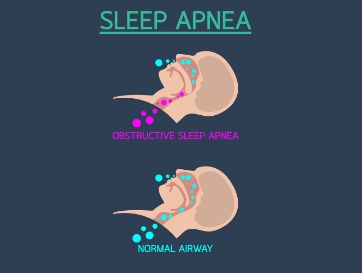Sleep apnea is commonly associated with adults, but it can also affect children. Pediatric sleep apnea, also known as childhood sleep apnea, is a sleep disorder characterized by interrupted breathing during sleep. In this article, we will explore the causes, symptoms, and available treatment options for children sleep apnea.

The causes of sleep apnea in children can vary. Here are some common factors that contribute to pediatric sleep apnea:
Enlarged Tonsils and Adenoids : The most common cause of sleep apnea in children is the enlargement of tonsils and adenoids. These structures can obstruct the airway during sleep, leading to breathing difficulties.
Obesity : Excess weight can increase the risk of sleep apnea in children, just as it does in adults. Obesity can contribute to airway narrowing and obstructive events during sleep.
Craniofacial Abnormalities : Certain facial or craniofacial abnormalities, such as a small jaw or narrow airway, can contribute to sleep apnea in children.
Neuromuscular Disorders : Children with neuromuscular disorders, such as muscular dystrophy or cerebral palsy, are at a higher risk of developing sleep apnea due to muscle weakness or abnormal control.

The following signs and symptoms may indicate the presence of Children Sleep Apnea :
Loud Snoring : Persistent and loud snoring is often a prominent symptom of sleep apnea in children.
Pauses in Breathing : Breathing pauses during sleep, often witnessed by parents or caregivers, may indicate sleep apnea.
Restless Sleep : Children with sleep apnea may exhibit restless sleep, frequent tossing and turning, or changes in sleep positions.
Mouth Breathing : Sleep apnea can cause children to predominantly breathe through the mouth during sleep.
Daytime Sleepiness : Excessive daytime sleepiness, difficulty waking up in the morning, or difficulty staying awake during the day may be present in children with sleep apnea.
Behavioral and Learning Issues : Sleep apnea can affect a child's cognitive function, behavior, and academic performance, leading to problems at school.
In some cases, children may outgrow sleep apnea, especially if the underlying cause is enlarged tonsils and adenoids. However, proper evaluation and treatment are essential to manage the condition.
Yes, obstructive sleep apnea can occur in children, often due to enlarged tonsils or adenoids.
Allergies can cause nasal congestion and inflammation, which can contribute to sleep apnea in some children.
Diagnosis typically involves a comprehensive evaluation, including a detailed medical history, physical examination, and a sleep study called polysomnography.
Yes, maintaining a healthy weight, promoting good sleep hygiene, and avoiding allergens or irritants can support the management of sleep apnea in children.
Sleep apnea can be associated with certain medical conditions, such as Down syndrome or craniofacial abnormalities. A thorough evaluation can help identify any underlying health concerns.
“Children sleep apnea is a condition that requires attention and proper management to ensure the well-being and healthy development of children. Recognizing the symptoms and seeking timely medical evaluation is crucial for effective treatment. If you suspect your child may have sleep apnea, consult with a healthcare professional who specializes in pediatric sleep disorders for a comprehensive assessment and guidance.”